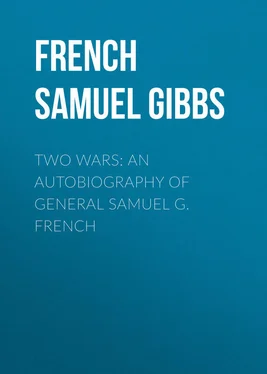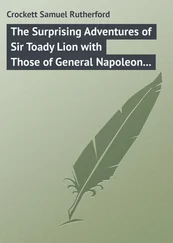Samuel French - Two Wars - An Autobiography of General Samuel G. French
Здесь есть возможность читать онлайн «Samuel French - Two Wars - An Autobiography of General Samuel G. French» — ознакомительный отрывок электронной книги совершенно бесплатно, а после прочтения отрывка купить полную версию. В некоторых случаях можно слушать аудио, скачать через торрент в формате fb2 и присутствует краткое содержание. Жанр: foreign_antique, foreign_prose, на английском языке. Описание произведения, (предисловие) а так же отзывы посетителей доступны на портале библиотеки ЛибКат.
- Название:Two Wars: An Autobiography of General Samuel G. French
- Автор:
- Жанр:
- Год:неизвестен
- ISBN:нет данных
- Рейтинг книги:4 / 5. Голосов: 1
-
Избранное:Добавить в избранное
- Отзывы:
-
Ваша оценка:
- 80
- 1
- 2
- 3
- 4
- 5
Two Wars: An Autobiography of General Samuel G. French: краткое содержание, описание и аннотация
Предлагаем к чтению аннотацию, описание, краткое содержание или предисловие (зависит от того, что написал сам автор книги «Two Wars: An Autobiography of General Samuel G. French»). Если вы не нашли необходимую информацию о книге — напишите в комментариях, мы постараемся отыскать её.
Two Wars: An Autobiography of General Samuel G. French — читать онлайн ознакомительный отрывок
Ниже представлен текст книги, разбитый по страницам. Система сохранения места последней прочитанной страницы, позволяет с удобством читать онлайн бесплатно книгу «Two Wars: An Autobiography of General Samuel G. French», без необходимости каждый раз заново искать на чём Вы остановились. Поставьте закладку, и сможете в любой момент перейти на страницу, на которой закончили чтение.
Интервал:
Закладка:
I remained in Pascagoula until the army had been sent hither and thither, according to the wants of the service. The last shipment of troops was some cavalry to Galveston, and I followed on after them, last of all, in an old propeller. It so happened, as I was leaving the wharf, that a captain of a vessel had just made an observation of the sun to get the time, and I set my watch by it. When we got out on the gulf a cyclone came on. The ship had no chronometer, and only anthracite coal, which made but little steam. The propeller was now spinning in the air; then motionless when under water. Finally the captain had to run before the wind to the south.
Some days after, when running north, we saw land, and made observations. I got the longitude from my watch. It said thirty miles from Galveston. The captain said that the land was the mouth of the Sabine river. Two hours after, we saw the shipping in Galveston, proving my observation correct. The wind was still blowing hard. No pilot boat could come out for us. It was a government ship, and I ordered the captain to make the harbor. The trouble was to find the outer buoy. Finally it was discovered, and we got in safely.
Gen. Twiggs had been assigned to the Department of Texas, and I found him in Houston. We remained there a few days; and, when the dragoons started for Austin, Twiggs, his aid, Capt. W. T. H. Brooks, and I took the stage for Austin also. It had been raining all day and all night when we started. From Houston to a small mound on the prairie twenty-five miles on the road the land was all under water, and still it rained. We crossed the Brazos river about noon, and went on in the rain, which continued all night. At 2 A.M. the driver turned out of the road, and down went the coach till the body was on the ground. The driver said that there was a farmhouse about four miles farther on. A horse was unhitched, and Gen. Twiggs was put on it bareback to ride to the house. Two passengers went on foot. I had in a satchel $5,000 in gold (government funds), which was in the box under the hind seat. Brooks said that he would stay there and guard it, if I would go on and get help. I also mounted a horse and overtook the General. When we reached the house, the farmer got up, had a fire made to dry our clothing, and agreed to send some mules to bring in the coach. The General made so many abusive remarks about Texas and the people that the farmer got mad, and said that the stage might "stay where it was;" but when he was satisfied that the remarks made by Twiggs were not personal, he started the servants for the coach. The General and I had to rest in the one bed the best we could.
Конец ознакомительного фрагмента.
Текст предоставлен ООО «ЛитРес».
Прочитайте эту книгу целиком, купив полную легальную версию на ЛитРес.
Безопасно оплатить книгу можно банковской картой Visa, MasterCard, Maestro, со счета мобильного телефона, с платежного терминала, в салоне МТС или Связной, через PayPal, WebMoney, Яндекс.Деньги, QIWI Кошелек, бонусными картами или другим удобным Вам способом.
1
A fête given by Maj. André in Philadelphia, May, 1778, in honor of Sir William Howe.
2
"Proclaim liberty throughout all the land unto all the inhabitants thereof." (Lev. xxv. 10.)
3
Newspaper cuttings.
4
August 31, 1898. Raynolds and Auger are now at rest, and four remain. April, 1899, Gen. J. J. Reynolds has passed over the river.
5
It is also reported that the first message over the line, sent by a young lady, was: "What hath God wrought!" The Professor did not mention this, and this dispatch was sent over the ocean cable years later.
6
In the celebrated Dred-Scott case (see Howard's "Supreme Court Reports," Vol. XIX., page 404) you will find that Justice Taney, in describing the condition of the negro more than a hundred years before the Declaration of Independence, said: "It is difficult at this day (1856) to realize the state of public opinion in relation to that unfortunate race which prevailed in the civilized portions of the world at the time of the Declaration of Independence, and when the Constitution of the United States was framed and adopted… They had, for more than a century before, been regarded as a being of an inferior order, and altogether unfit to associate with the white race, either in social or political relations; and so far inferior that they had no rights which the white man was bound to respect; and that the negro might justly and lawfully be reduced to slavery for his benefit. He was bought and sold, and treated as an ordinary article of merchandise and traffic whenever a profit could be made by it. The opinion was, at that time , fixed and universal in the civilized portions of the white race."
The above is merely a historical fact as regards the status of the negro about two hundred years before the judge rendered his decision. And now behold! For political party purposes; by the abolitionists; from the pulpit; by college professors; by all who have hated the South, it is to this day tortured into a decision made by Chief Justice Roger B. Taney, which is not true. Furthermore, and before this case was in court, Judge Taney had manumitted his own, inherited, slaves; and as a lawyer had defended a man in court for publicly uttering abolition sentiments. In fact he regarded slavery as an evil, and proclaimed it by deeds. (See "American Authors' Guild Bulletin" for April, 1898.)
7
Col. Harney was annoyed by the number of blackbirds that would feed with the horses, eating the grain; so while the horses were out grazing I asked an officer for a gun to kill some of the birds. He handed me a long single-barreled one with a bore about the size of a half dollar. From the powder flask I put in two charges of powder and shot. The ground was covered with birds. I fired and killed none; the charge was too small. The doctor (I think he was a doctor) said he would load it for me, so I took another shot. This time I thought my arm dislocated at the shoulder. I did not count the number of birds, but the ground was covered with the dead and wounded. I played indifference while meditating revenge for a sore shoulder. Going to the top of the observatory, I saw perhaps a hundred deer grazing close by; so I was taken with a desire to kill one, and again asked the doctor for his gun. He proposed loading it for me. I told him I preferred doing it myself. I put in three charges of powder, or three drams, and about forty small buckshot, and off I went for a deer. The herd grazed along before me up the slope of a ridge, and passed over it. I crawled on hands and knees to the crest, and such a sight! A number of single deer were within twenty yards of me. At once I became covetous. Shoot a single deer? No. I wanted four or five (remembering "all things come to those who wait"), so presently five or six were nearly in a line, but more distant; and when I pulled the trigger the gun said "fush," and the smoke came in my face. As I looked over the field I was amazed. There were all the deer standing facing me, their heads high, ears spread out wide, and their large, soft, mild eyes looking at me imploringly; and not alarmed. Probably they had never heard a gun (and I am quite sure they did not hear this one), for the Indians then were armed only with bows and arrows.
Читать дальшеИнтервал:
Закладка:
Похожие книги на «Two Wars: An Autobiography of General Samuel G. French»
Представляем Вашему вниманию похожие книги на «Two Wars: An Autobiography of General Samuel G. French» списком для выбора. Мы отобрали схожую по названию и смыслу литературу в надежде предоставить читателям больше вариантов отыскать новые, интересные, ещё непрочитанные произведения.
Обсуждение, отзывы о книге «Two Wars: An Autobiography of General Samuel G. French» и просто собственные мнения читателей. Оставьте ваши комментарии, напишите, что Вы думаете о произведении, его смысле или главных героях. Укажите что конкретно понравилось, а что нет, и почему Вы так считаете.












